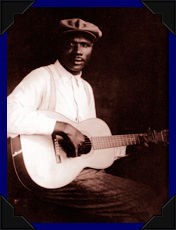
Born January 1, 1888, in White Haven, Tennessee, two miles north of the Mississippi state line, Frank Stokes was raised in Tutwiler, Mississippi, after the death of his parents. As a youth Stokes learned to play guitar before moving to Hernando, Mississippi, home to guitarists Jim Jackson, Dan Sane, Elijah Avery (of Cannon's Jug Stompers), and Robert Wilkins. In Hernando, Stokes worked as a blacksmith, traveling to Memphis on the weekends to play guitar.
Possessed of a powerful voice and driving guitar style, Stokes busked on the streets of Memphis playing a variety of minstrel tunes, early blues, ragtime numbers, breakdowns, and popular songs of the day. His breadth of musical knowledge made him the embodiment of the rural black musical tradition up to the early twentieth century. Stokes joined forces with fellow Mississippian Garfield Akers as a blackface songster, comedian, and buck dancer in the Doc Watts Medicine Show, a tent show that toured the South during World War I.
Tiring of the road, Stokes settled in Oakville, Tennessee, to work as a blacksmith, an occupation that allowed him to play dances, picnics, fish fries, saloons, and parties at his leisure. During the 1920s he teamed with guitarist Dan Sane, joining Jack Kelly's Jug Busters to play white country clubs, parties and dances, and playing Beale Street together as the Beale Street Sheiks. This group first recorded the stomping party music they performed on the streets in August 1927. The fluid guitar interplay between Stokes and Sane, combined with a propulsive beat, witty lyrics, and Stokes's stentorian voice, make their recordings irresistible. Their duets also influenced Memphis Minnie in her duets with husband Kansas Joe McCoy. The Sheiks recorded again a year later in the Memphis Auditorium (a session where Furry Lewis also recorded), waxing more fine blues and adding to their considerable stature. They continued to busk the streets, playing Church's Park (now W.C. Handy Park) on Beale Streetin addition to the usual round of parties, fish fries, and suppers. Stokes's last recording session was again in Memphis in 1929, but the race-record-buying public's rapidly changing tastes lessened his commercial appeal. He was still a popular performer, however, appearing in medicine shows, the Ringling Brothers Circus, and other tent shows during the 1930s and 1940s. During the 1940s, Stokes moved to Clarksdale, Mississippi, and occasionally worked with Bukka White in local juke joints.
Frank Stokes died in Memphis, Tennessee, September 12, 1955. He is buried in Hollywood Cemetery.
Music Samples
Last updated: October 27, 2017
